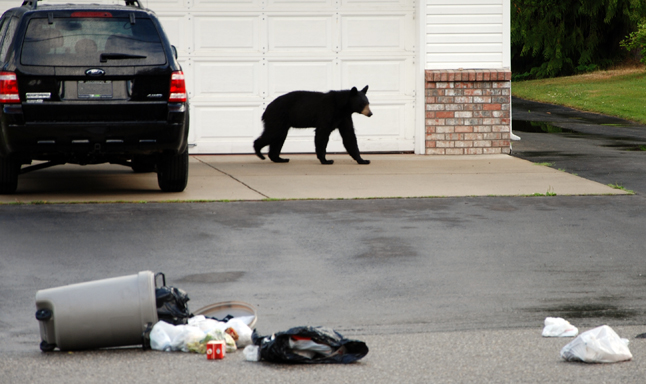
Bears are already waking up in areas to the south of us, and soon they will be awake and looking for food in Revelstoke,” says a statement issued last weekend by Bear Aware Coordinator Sue Davies.
“Last season the first bear sighting was on the 28th of April, but emergence timing is highly variable, depending on the season and on the bear,” she said.
In fact, local residents should start taking precautions to prevent bears from foraging through their household garbage.
“This photo shows a young black bear, very early in the season. Note its slim, in contrast to the fat bears we often see in the fall. This bear needs a huge amount of food to build up its fat stores before next winter and it’s looking for the easiest and highest calorie foods available.”
Garbage cans are easy food sources for bears. What we think of as smelly waste is, to bears, a bonanza of calories.
Bears are usually wary of humans but with an inducement as strong as free food they will come near houses and other human structures and can become dangerous as a result. Bears that are deemed dangerous are usually destroyed because relocation has proved to be ineffective in most cases.
Last year in Revelstoke only two bears were destroyed, however, that is still two too many. Davies said she hopes this will be a kill-free year.
Her statement also included tips for a conflict-free summer with our ursine neighbours:
• Start being Bear Aware now.
• Store your garbage inside a locked building or in a bear-proof garbage bin.*
• Think about pruning your fruit trees to keep them to a manageable size.**
• Take down your birdfeeders or make sure they are inaccessible to bears.
• Ensure your compost is not smelly and contains no cooked foods.
• Keep pet food secure and feed pets indoors (or remove dish as soon as pet has finished).
• Ensure all livestock and livestock food is secured with electric fencing.
• Keep BBQs clean and stored in a garage.
Contact Revelstoke Bear Aware at 250-837-8624 or beaware@telus.net for more information on how to manage bear attractants, or to register for the fruit-tree pruning workshop. You can also visit the Bear Aware website atwww.revelstokebearaware.org to view the Google Earth Bear Sighting Map. To report bear sightings or conflict with bears please call the RAPP Line at 1-877-952-7277.



